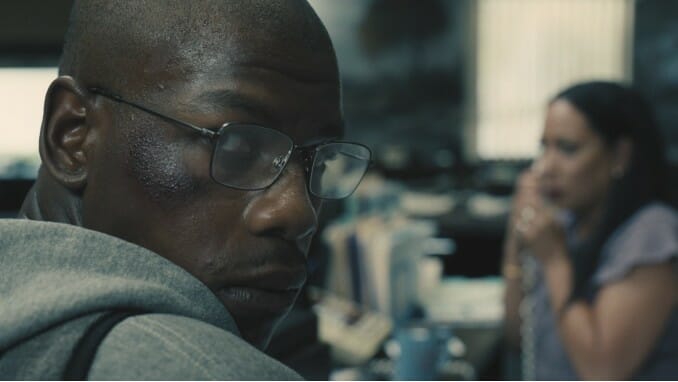John Boyega Turns in Another Nuanced Performance in Mishandled Hostage Drama 892

In 2017, 236 mentally ill people were killed by police. That number isn’t the title of this movie, just another figure devastatingly meaningful to some and impersonal to others. 892 sees John Boyega continue his dramatic hot streak from 2020’s Small Axe: Red, White and Blue, playing a down-and-out ex-Marine who holds a bank hostage. Based on the real life of Brian Easley, director Abi Damaris Corbin (who co-wrote with Kwame Kwei-Armah) makes her debut with 892, which references the modest dollar amount Brian, who reportedly suffered from PTSD and paranoid schizophrenia, sought from this desperate act. While Boyega’s performance is some of his strongest work yet, the movie he supports has a hard time illustrating either Brian or the predatory institutions that pushed him into that Wells Fargo in the first place.
Ironically, physically getting him there is one of the most effective sequences in the film. As Brian heads from his hotel to the bank in the racially divided suburbs outside Atlanta, the very infrastructure of the city is against him. He walks down ugly embankments and on the sides of highways, past encampments that portend his fate once the hotel money runs out. There aren’t many places constructed to be kind to those facing poverty, and here is no different. But Brian isn’t holding this bank and two employees hostage because of poverty. He’s not robbing the bank. He just wants his disability check from the V.A., which was frittered away by byzantine rules surrounding the G.I. Bill. This is simply the easiest way to get the world’s attention.
As a hostage film—with Boyega only really playing off of the great Nicole Beharie (whose terror manifests in a quavering voice, easy tears and a steely face) and Selenis Leyva (considerably more shocked)—most of 892 involves watching Brian on the phone. Boyega’s committed and dignified desperation keeps this cinematically inert concept watchable. In wire-frames, a frumpy gray hoodie and a scraggly half-stache, his constant apologies go further than any grand speeches. He’s sorry, for both his manic, distrustful outbursts that seem truly uncontrollable and for any rudeness he may be inflicting upon his hostages. The seriousness with which he handles phone calls from would-be customers, taking their messages as he’s holding up the place, is just as telling as the way he sweats and stammers under a desk when he realizes the cops will be setting up snipers. Boyega’s deliveries are earnest and sure, though his hands often twitch to his head. It’s a transparent wholesomeness, clouded by our country’s mistreatment of veterans, Black men and those with mental illnesses.
These mistreatments are alluded to in flashbacks brief enough to be unclear and long enough to sap the bank’s lobby of any power as a claustrophobic location. We see a passing helicopter trigger a memory of military service; a quick and unexplained shot of Brian being violently handcuffed at the V.A. What we do learn about him is metered out in dull conversation with a reporter (Connie Britton) while the film takes its sweet time getting the actual negotiation process started. It’s not that the nation’s failing support net gets off scot-free, but that so much of the film is about proving to us that Brian is a nice, regular guy deserving of love—spending long passages outside the situation with his ex-wife and daughter—that there’s very little room for more. Thanks to Boyega, it’s clear within minutes what kind of person Brian is, so the rest feels extraneous, like scenes called as character witnesses for those having a hard time with empathy.
-

-

-

-

-

-

-

-

-

-

-

-

-

-

-

-

-

-

-

-

-

-

-

-

-

-

-

-

-

-

-

-

-

-

-

-

-

-

-

-








































